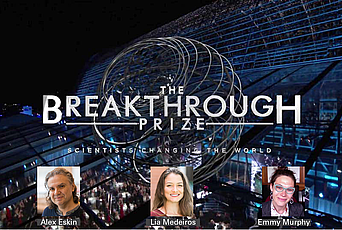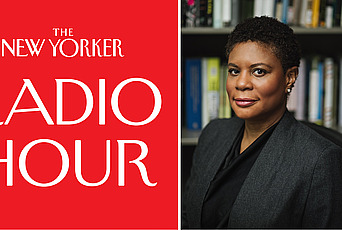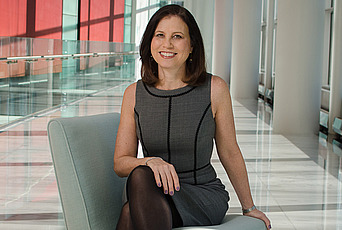Five New Permanent Faculty Join the Institute for Advanced Study, Broadening IAS Research
Press Contact

With the opening of the academic year on September 23, the Institute for Advanced Study welcomes an extraordinary group of new Faculty—Suzanne Conklin Akbari, Jacob Lurie, Alondra Nelson, Jim Stone, and Misha Tsodyks—who bring new fields and depth of study to the IAS. The appointment of five permanent Faculty in a single year is a remarkable achievement that underscores the breadth and influence of IAS as a leading global center for theoretical research.
The new Professors are among 26 permanent Faculty and will work alongside 272 leading scholars and scientists, who join the IAS community as Members, Visitors, and Research Associates, among other individuals participating in academic activities, to engage in curiosity-driven research for the 2019–20 academic year.
This year’s new Faculty expand the diverse scope of IAS research, contributing new perspectives in literary studies; modern algebra, geometry, and topology; the sociology of science; computational astrophysics; and neuroscience. Their collective work within these fields is widely acclaimed for its originality, uniting various traditions of thought, and accelerating knowledge.
“It is my pleasure to welcome new and returning Members and Faculty to our IAS community for another academic year that will allow time and space for independent study as well as dialogue,” said Robbert Dijkgraaf, Institute Director and Leon Levy Professor. “Given the freedom to take risks, exchange ideas, and pioneer new methodologies, our annual visiting scientists and scholars are able to take their research in unexpected directions. I look forward to seeing how this year’s diverse class will enhance and test our perceptions of the world.”
IAS Members, who comprise the vast majority of the incoming class, include pioneering thinkers such as Cord Whitaker in the School of Historical Studies, an Associate Professor at Wellesley College, who is interested in the history and development of race and racism in medieval English literature. Lia Medeiros, an astrophysics postdoctoral fellow in the School of Natural Sciences who received her Ph.D. in physics from the University of California, Santa Barbara, is interested in using astronomical objects and phenomena to test fundamental theories of physics.
IAS scholars are selected in a highly competitive process for their bold ideas, innovative methods, and deep research questions by the permanent Faculty, each of whom are preeminent leaders in their fields. This year’s scholars arrive from 107 institutions and 22 countries.
Hosting a special year on Theoretical Machine Learning, the School of Mathematics will bring together elite researchers to explore the many facets of deep learning and develop the mathematical underpinnings of this emerging field. Chris J. Maddison, a Senior Research Scientist at DeepMind who joins the School of Mathematics this year, is developing methods for machine learning and exploring foundational questions about how learning from data is possible.
The School of Social Science will confront the rise of automation, new technologies, and developing markets, among other profound transformations in the global economic order, as part of its annual theme, “Economy and Society.” Member Julia Ott, Associate Professor of History at the New School for Social Research, will examine the origins of venture capital as an idea, as a form of investment, and as an organized industry.
Employing the tools of modern physics, mathematics, computer science, and now neuroscience, the Simons Center for Systems Biology in the School of Natural Sciences is dedicated to advancing fundamental understanding of evolution, basic molecular biology, and human cognition, as well as championing breakthrough research to diagnose and treat cancer, viruses, and other diseases.
Learn more about our scholars and their research here. A publication of current Faculty and Members is also available here.
About the Institute
The Institute for Advanced Study is one of the world's foremost centers for theoretical research and intellectual inquiry. Located in Princeton, N.J., the IAS is dedicated to independent study across the sciences and humanities. Founded in 1930 with the motto "Truth and Beauty," the Institute is devoted to advancing the frontiers of knowledge without concern for immediate application. From founding IAS Professor Albert Einstein to the foremost thinkers of today, the IAS enables bold, nonconformist, field-leading research that provides long-term utility and new technologies, leading to innovation and enrichment of society in unexpected ways.
Each year, the Institute welcomes more than 200 of the world's most promising researchers and scholars who are selected and mentored by a permanent Faculty, each of whom are preeminent leaders in their fields. Comprised of four Schools—Historical Studies, Mathematics, Natural Sciences, and Social Science—IAS has produced an astounding record of introducing new understanding and is responsible for undeniable progress across disciplines and generations, from the development of one of the first stored-program computers to the establishment of art history as a discipline in the United States. Among its present and past Faculty and Members are 33 Nobel Laureates, 42 of the 60 Fields Medalists, and 18 of the 20 Abel Prize Laureates, as well as many MacArthur Fellows and Wolf Prize winners.


